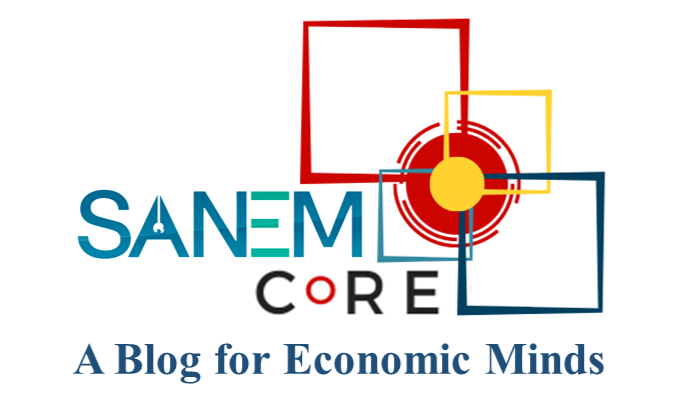The term ‘Economic governance’ refers to the policies and regulatory structures implemented by governments to manage the economy. It covers two main aspects of public policy-the management of the overall economy, known as macroeconomic management, and the management of individual sectors or aspects of the economy, known as microeconomic management.
Economic governance is essential for Bangladesh to achieve the sustainable development goals (SDGs) by 2030, transition to an upper-middle-income status by 2031, and advance to a high-income status by 2041. As Bangladesh is also expected to graduate as a developing country by 2026, it is crucial to identify the policy priorities and action plans to establish good governance and fairness in the economy. The 8th Five Year Plan (8FYP), the Second Perspective Plan (2021-2041), and the Delta Plan 2100 of Bangladesh emphasize the long-run national goals which are aligned with the development targets.
What is the current state of Bangladesh’s macroeconomic management? During the last two fiscal years (FY2022-23 & FY2023-24), Bangladesh experienced the worst macroeconomic instability in recent years. Inflationary pressures have been particularly pronounced, with the monthly average inflation rate rising from 6.33% in July 2022 to 9.20% in July 2023 and further to 9.69% in March 2024. Similarly, the point-to-point inflation rate surged from 7.48% in July 2022 to 9.69% in July 2023 and 9.81% in March 2024. Such inflation rates not only exceed the global average but also surpass the central bank’s target of 7.5% for FY2023-24, prompting concerns regarding their alignment with development goals. The official exchange rate witnessed a depreciation of approximately 16% between July 2022 and March 2024, while foreign exchange reserves plummeted from USD 39.6 billion to USD 25.2 billion during the same period. In response to exchange rate volatility and dwindling reserves, Bangladesh Bank implemented stringent import restrictions by tightening control over letters of credit (LCs), adversely affecting domestic investment. Another noteworthy aspect is the central bank’s decision to fix the interest rate at 9-6% in April 2020, which persisted until mid-2023. This unconventional move rendered monetary policy instruments ineffective in curbing inflationary pressures. The escalating external debt servicing obligations also pose a growing concern for Bangladesh. According to the Economic Relations Division (ERD), external debt reached USD 100.6 billion in December 2023, with 79.2% attributed to the public sector and 20.8% to the private sector. The external debt-to-GDP ratio has been on a steady rise, increasing from 13.2% in FY2015-16 to 15.9% in June 2023.
On the other hand, Bangladesh’s microeconomic management can be evaluated through various aspects, including the business environment, banking sector performance, and government expenditure on education, health, and social protection. The country faces significant challenges in its business environment, notably high operational costs and bureaucratic complexities in obtaining business licenses. Additionally, the energy sector suffers from a lack of competition. Access to finance remains a hurdle for small and medium-sized enterprises, while major industry sectors grapple with issues related to wages, working conditions, and dispute resolutions between employers and employees. Inadequate infrastructure, such as roads, electricity, gas, and internet connectivity, also poses a major challenge. Concerning the financial sector, issues like rising non-performing loans (NPLs), subdued private sector investment, dwindling confidence in the stock market, and fraudulent practices in the insurance market are prominent. These factors collectively impact the business climate, contributing to low foreign direct investment (FDI) flows into the country. Moreover, over the past two decades, government spending on crucial sectors like education, health, and social protection has remained disappointingly low. This limited expenditure reflects a broader challenge in addressing social welfare and developing human capital, essential to robust microeconomic management.
Are institutions weak in Bangladesh? An analysis of the World Bank’s Worldwide Governance Indicators (WGI) provides insights into the state of institutions in Bangladesh. The WGI assesses governance quality across six major dimensions: control of corruption, government effectiveness, political stability and absence of violence, regulatory quality, rule of law, and voice & accountability. Over the past two decades, Bangladesh has consistently scored negatively in all these areas, indicating challenges in governance and institutional strength. Strengthening economic governance, therefore, emerges as a key avenue for improving overall governance and institutional performance in the country.
Recent irregularities in Bangladesh’s economic landscape highlight the urgent need for robust governance measures. These challenges have brought to the fore the critical importance of transparency, accountability, and efficiency within the country’s economic framework. As Bangladesh strives to align with its long-term development goals and establish a resilient economy, it is imperative to address these issues head-on. Implementing appropriate measures in the short to medium term is crucial for enhancing the integrity and functionality of the nation’s economic governance.
To strengthen the governance of Bangladesh’s macroeconomy, policymakers should prioritize fiscal discipline by implementing prudent budgetary measures. Concurrently, enhancing tax collection mechanisms is imperative to augment revenue streams, providing the government with the necessary funds for essential services and infrastructure projects. Monetary policies must be carefully crafted to curb inflation. Another pivotal aspect of macroeconomic governance entails a strategic emphasis on exchange rate management. By ensuring a stable and competitive exchange rate, policymakers can bolster international trade and attract foreign investment. Simultaneously, maintaining robust foreign exchange reserves serves as a buffer against external shocks, fortifying the country’s economic resilience. Moreover, fostering diversified economic sectors is paramount for sustained stability. This involves reducing dependency on a single industry like RMG, thereby mitigating risks associated with economic volatility.
On the microeconomic front, reforms should focus on simplifying business processes, fostering competition, and supporting Small and Medium Enterprises (SMEs) through improved access to finance. Labour market reforms, reforms in the financial sector, infrastructure development, and strategic investments in education, health, and social protection are essential for building a conducive business environment and fostering inclusive growth.


RECENT COMMENTS